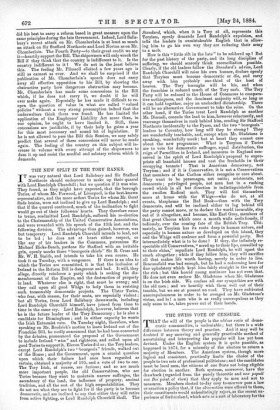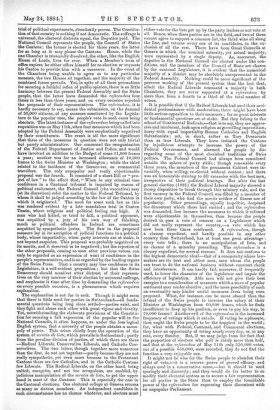THE SWISS VOTE OF CENSURE.
THAT the will of the people is the ultimo ratio of demo- cratic communities, is undeniable ; but there is a wide difference between theory and practice. And it may well be doubted if any unerring and generally practicable method of ascertaining and interpreting the popular will has yet been devised. Under the English system it is quite possible, as happened in 1874, for a minority of the electors to return a majority of Members. The American system, though more logical and consistent, practically limits the choice of the people to two sets of professional politicians ; and the candidates must be local men, the citizens of one State not being eligible for election in another. Both systems, moreover, have the drawback (regarded from the purely theoretic and vox populi vox Del point of view) that they apply to men and not to measures. Members elected to-day may to-morrow pass a law or sanction a policy that, if the alternative were offered to them, their constituents would unhesitatingly reject, as the recent ex- perience of Switzerland, which acts as a sort of laboratory for the
trial of political experiments, abundantly proves. The Constitu- tion of that country is nothing if not democratic. The suffrage is universal, the electoral districts equal, the Deputies paid. The National Council represents the people, the Council of States the Cantons ; the former is elected for three years, the latter for as long as it may please the Cantons. Hence, while the one Chamber is triennially dissolved, the other, like the English House of Lords, lives for ever. When a Member's term of office expires, he either offers himself for re-election or requests his Canton to provide him with a successor. In the event of the Chambers being unable to agree as to any particular measure, the two Houses sit together, and the majority of the combined forces prevails. Yet, in spite of all these precautions for securing a faithful reflex of public opinion, there is so little harmony between the present Federal Assembly and the Swiss people, that the latter have demanded the referendum four times in less than three years, and on every occasion rejected the proposals of their representatives. The referendum, it is hardly necessary to say, means the submission, on the demand of 30,000 citizens, of any measure sanctioned by the Legisla- ture to the popular vote, the people's veto in such cases being absolute. The latest instance of the referendum being called into requisition was on May 11th, when four measures which had been adopted by the Federal Assembly were emphatically negatived by their constituents. The event is all the more significant that three of the measures in question were not only trivial but purely administrative. One concerned the reorganisation of the Federal Department of Justice and Police, and would have involved an addition to the Budget of some 11,000 francs a year; another was for an increased allowance of 10,000 francs to the Swiss Minister at Washington ; while the third related to the incidence of the licence-tax on commercial travellers. The only unpopular and really objectionable proposal was the fourth. It consisted of a short Bill or " pro- ject of law " to the effect that, " When in any criminal case confidence in a Cantonal tribunal is impaired by reason of political excitement, the Federal Council (the executive) may (at its discretion) refer the matter to the Federal Tribunal, by whom it shall be judged according to the law of the Canton in which it originated." The need for some such law as this was rendered evident by a late scandalous trial in Canton Tessin, where religious and political feeling run high. A man who had killed, or tried to kill, a political opponent, was acquitted by a jury of his own way of thinking, much as political offenders in Ireland are sometimes acquitted by sympathetic juries. The flaw in the proposed measure lay in its ascription of judicial functions to a political body, whose impartiality, when party interests are at stake, is not beyond suspicion. This proposal was probably negatived on its merits, and it deserved to be negatived ; but the rejection of the other proposals, coming so soon after previous vetoes, can only be regarded as an expression of want of confidence in the people's representatives, and is so regarded by the leading organs of the Swiss Press. That a country may lose confidence in its Legislature, is a self-evident proposition ; but that the Swiss Democracy should manifest utter distrust of their represen- tives on the very morrow of their election by universal suffrage, and emphasise it time after time by demanding the referendum on every possible occasion, is a phenomenon which requires explanation.
The explanation is not far to seek. Though it might seem that there is little need for parties in Switzerland—all funda- mental questions being long since settled—parties exist, and they fight and abuse each other with great vigour and vivacity. Yet, notwithstanding the elaborate provisions of the Constitu- tion for securing a full expression of the popular will in the National Councils, it often happens, as under the less logical English system, that a minority of ;he people obtains a mono- poly of power. This arises chiefly from the operation of the system of scrutin de liste, which prevails in Switzerland ; partly from the peculiar division of parties, of which there are three —Radical Liberals, Conservative Liberals, and Catholic Con- servatives. The two latter, though together more numerous than the first, do not act together—partly because they are not really sympathetic, yet even more because in the Protestant Cantons there are few Catholics, and in the Catholic Cantons few Liberals. The Radical Liberals, on the other hand, being united, energetic, and not too scrupulous, are enabled, by judicious manipulation of the scrutin de lisle, to get the upper hand in most of the Cantons. This is especially the case in the Cantonal elections. One electoral college at Geneva returns as many as sixteen members. An independent candidate in such circumstances has no chance whatever, and electors must
either vote for the lists got up by the party leaders or not vote at all. Hence, when three parties are in the field, and two of them cannot agree to support a common list, the third wins all along the line, and returns every one of its candidates, to the ex- clusion of all the rest. There have been Great Councils at Geneva in which the nominal minority, yet actual majority, were represented by a single deputy. As, moreover, the deputies to the National Council are elected under like con- ditions, and the members of the Council of State are chosen by the cantonal Legislature, it is evident that the numerical majority of a district may be absolutely unrepresented in the Federal Assembly. Nothing could be more significant of the perverse working of the present system than the fact that, albeit the Radical Liberals command a majority in both Chambers, they are never supported at a referendum by more than from a fourth to a third of the total number of voters.
It is possible that if the Radical Liberals had used their acci- dental predominance with moderation, there might have been little serious opposition to their measures ; for no great interests or fundamental questions are at stake. But they belong to the school of Continental Radicals,—that is to say, they are aggres- sive and intolerant, look upon religion as grovelling superstition, harry with equal impartiality Roman Catholics and English Salvationists ; act, in short, rather as Tory Democrats than as true Liberals. They have irritated the Cantons by injudicious attempts to increase the power of the Federal Government, and alarmed the people by dis- regarding some of the most cherished traditions of Swiss politics. The Federal Council had always been considered outside the sphere of party strife ; though renewable every three years, the members of the permanent Cabinet were in- variably, when willing, re-elected without contest ; and there was an honourable striving to fill vacancies with the best men, irrespective of their political leanings. But after the last general election (1881) the Radical Liberal majority showed a strong disposition to break through this salutary rule, and the first vacancy in the Federal Council was filled by a member of their own party, who had the merits neither of fitness nor of popularity. Other proceedings, equally impolitic, deepened the discontent which these had excited ; and the referendum was demanded, less because the measures to which it referred were objectionable in themselves, than because the people desired to pass a vote of censure on a Legislature which did not really represent the country,—a vote which has now been three times confirmed. A referendum, though a clumsy expedient, and hardly possible in any other country than Switzerland, has at least one great advantage : every vote tells ; there is no manipulation of lists, and no chance of a minority prevailing. The referendum is a clumsy expedient, for several reasons. It does not conform to the highest democratic ideal—that of a community whose law- makers are its best and ablest men, men whom the people can trust to do the national business without constant check and interference. It can hardly fail, moreover, if frequently used, to lower the character of the legislature and impair the efficiency of legislation. Able men will not give their best energies to a consideration of measures which a wave of popular sentiment may render abortive ; and the mere possibility of such an eventuality may hinder useful measures from being even proposed. What, for instance, can be more absurd than the refusal of the Swiss people to increase the salary of their Minister at Washington from 60,000 francs, which he finds insufficient to keep up his position, or even to pay his way, to 70,000 francs ? Another evil of the referendum is the increased frequency of votings which it entails. If voting be a pleasure, then ought the Swiss people to be the happiest in the world ; for, what with Federal, Cantonal, and Communal elections, they have an opportunity of voting nearly every day, or, at any rate, every Sunday. But, if we may judge from the fact that the proportion of electors who poll is rarely more than half, and that at the referendum of May 11th only 350,000 votes, out of a possible 650,000, were recorded, they do not find the function a very enjoyable one.
It might not be wise for the Swiss people to abandon their right of veto,—it is a reserve power of proved efficacy, and always used in a conservative sense,—but it should be used sparingly and discreetly ; and they would do far better to so modify their electoral system as to secure a fair representation for all parties in the State than to employ the formidable power of the referendum for expressing their discontent with an unpopular Parliament.

































 Previous page
Previous page